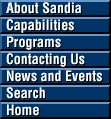FOR IMMEDIATE RELEASE
April 3, 2002
World’s experts to discuss policy dilemmas
at International Arms Control Conference
ALBUQUERQUE, N.M. — It’s been an interesting year for arms control negotiators and policymakers. In the past 12 months, US-Russia nuclear postures have evolved, nuclear proliferation fears have been raised, the US ballistic missile defense regime has matured, and much of the world has united against terrorism.
This month some 275 ambassadors, policy-makers, academicians, and other experts representing the United Nations, NATO, and 35 countries will gather in Albuquerque to discuss these issues and others at the 12th Annual International Arms Control Conference, April 18-20.
Although no formal agreements are negotiated at the conference, the meeting has become a primary policy-exploration and -discussion meeting for the world’s arms control experts, who shape the policy options for controlling nuclear, chemical, and biological weapons that are eventually brought to the negotiating table by their various, respective nations.
This year’s conference, themed “Implications of 9/11 on National Security and the Path Forward to Peace,” will feature keynote addresses by international luminaries in arms control (see highlights below). Panels of distinguished government officials and foreign affairs experts from around the world will discuss the following topics:
- US and Russian Federation Relations: A New Framework?
- Future of Arms Control Treaties and Agreements
- Implications of Informal Agreements
- Bioterrorism: From Theory to Reality
- Geopolitics from Central Asia to the Middle East
Sandia National Laboratories’ Division of National Security and Arms Control is host for the conference. The division’s mission includes helping political and technical experts from around the world acquire the technology needed to monitor and control the proliferation of weapons of mass destruction.
| Members of the news media are welcome to cover the conference. However, to allow for a free exchange of ideas, reporters are asked to follow special attribution guidelines for material gathered during open sessions. Please contact John German at 505-844-5199 for details. |
“This conference brings together key leaders and policymakers in the arms control and nonproliferation communities to discuss issues that are of concern to nations around the world,” says conference chairman Dr. James Brown of Sandia. “Previous conferences have allowed for a creative exchange of ideas and have resulted in valuable relationships among some of the world’s top arms control and nonproliferation experts.”
The conference takes place at the Sheraton Uptown Hotel in Albuquerque (call 800-252-7772 for accommodations).
If you plan to attend the conference as a member of the news media, please contact John German, Sandia Media Relations, at 505-844-5199 or jdgerma@sandia.gov.
To register for the conference as a participant, please contact conference coordinator Evangeline Clemena at 505-284-5047, edcleme@sandia.gov.
Sandia is a multiprogram laboratory operated by Sandia Corporation, a Lockheed Martin Company, for the United States Department of Energy under contract DE-AC04-94AL85000. With main facilities in Albuquerque, N.M., and Livermore, Calif., Sandia has major research and development responsibilities in national security, energy and environmental technologies, and economic competitiveness.
News Media Contact:
John German, jdgerma@sandia.gov, Media Relations Office, Sandia National Laboratories, (505) 844-5199
Highlighted speakers (subject to change)
| April 18, 8 p.m. (dinner keynote): |
Dr. Alan Zelicoff, senior scientist, Sandia National Laboratories, “After the Fall: The Next Protocol for the Biological Weapons Convention”
Dr. Zelicoff, a physician and physicist, is a member of the U.S. delegation to the Biological Weapons Convention and a vocal authority on bioweapons nonproliferation and early detection of infectious disease outbreaks. |
| April 19, 8 a.m. (opening session): |
John Wolf, Assistant Secretary (designate), Bureau of Nonproliferation, U.S. Dept. of State, “Title TBA”
Mr. Wolf has served as special adviser to the President and Secretary of State for Caspian Basin Energy Policy and U.S. Ambassador to Malaysia and APEC. His early State Dept. career included assignments in Australia, Vietnam, Greece, and Pakistan. |
| April 19, 12:15 (lunch keynote): |
Dr. Bruno Tertrais, Foundation pour la Recherche Strategique, France, “International Security and Arms Control After 9/11: A European Perspective”
Dr. Tertrais has served as Special Assistant to the Director of Strategic Affairs and as a policy analyst in the French Ministry of Defense, Visiting Fellow at the RAND Corporation, and Director of the Civilian Affairs Committee, NATO Assembly, Brussels. |
| April 19, 8 p.m. (dinner keynote): |
Mr. Liu Jieyi, Director General, Department of Arms Control and Disarmament, Ministry of Foreign Affairs, People’s Republic of China (PRC), “Strengthening International Cooperation, Safeguarding World Security”
Mr. Liu Jieyi has served in several assignments with the PRC’s Ministry of Foreign Affairs. He also served as the Chinese Governor in the Asia-Europe Foundation and as counselor to the Permanent Mission of the PRC to the United Nations. |
|
